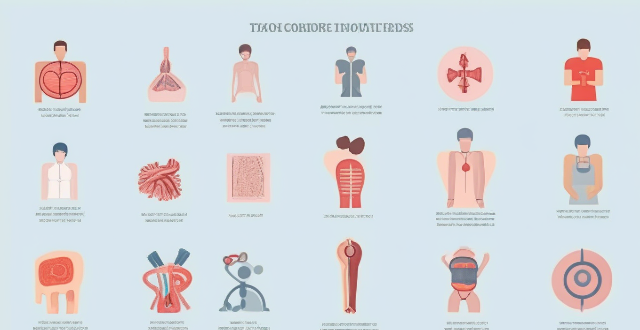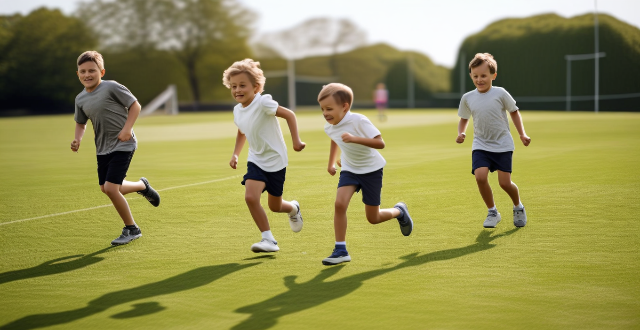Performance Body

In what ways do factors like body composition and flexibility affect sports biomechanics ?
In sports biomechanics, body composition and flexibility are crucial factors affecting performance. Increased muscle mass and a high strength-to-weight ratio enhance power in weightlifting and sprinting. A lower fat percentage improves aerodynamics and reduces energy expenditure in endurance activities. Higher bone density offers better support in impact-heavy sports. Greater flexibility increases the range of motion, preventing injuries and improving efficiency in rapid movements. Optimal body composition and flexibility can significantly improve an athlete's performance and reduce injury risk.

What role does mental preparation play in improving running performance ?
Mental preparation is key to improving running performance. It involves setting clear goals, using visualization techniques, practicing mindfulness exercises, and employing self-talk strategies. By training the mind to focus on the task at hand, manage stress, and maintain motivation, runners can enhance their physical performance and achieve their running goals.

How does hydration impact athletic performance and health ?
Hydration is crucial for athletic performance and health. Adequate hydration maintains energy levels, muscle function, joint lubrication, heart rate, and cognitive function during exercise. Dehydration can lead to fatigue, muscle cramping, increased heart rate, impaired cognitive abilities, and decreased physical performance. Proper hydration also aids digestion, kidney function, skin health, immune system function, and body temperature regulation. Chronic dehydration can increase the risk of kidney stones, digestive issues, weakened immune system, and other health problems. Therefore, it is essential for athletes to stay well-hydrated to achieve optimal performance levels and support their overall health.

Can napping improve athletic performance ?
**Can Napping Improve Athletic Performance?** Napping is a common practice among athletes and non-athletes alike, but can it really improve athletic performance? Research suggests that napping can aid in physical recovery and enhance cognitive function. Physical Recovery: - **Muscle Repair**: Sleep produces growth hormone, aiding in muscle repair and growth. - **Reduced Inflammation**: Sleep reduces inflammation, leading to better recovery after exercise. Cognitive Function: - **Improved Focus**: A quick nap can improve focus and concentration for peak performance. - **Enhanced Learning**: Sleep consolidates memories, allowing athletes to learn from mistakes and improve skills faster. Effective Napping Tips: Timing: - **Power Naps**: Limit naps to 20-30 minutes to avoid deep sleep and feeling groggy upon waking. - **Timing Before Bedtime**: Avoid napping too close to bedtime to prevent disrupting the nighttime sleep cycle. Environment: - **Quiet and Dark**: Find a quiet, dark place to nap for better sleep quality. - **Comfortable Surface**: Choose a comfortable surface to prevent waking up with aches and pains. In conclusion, napping can improve athletic performance by aiding physical recovery and enhancing cognitive function. It's important to nap effectively by timing your naps appropriately and creating a comfortable environment.

What is the relationship between sleep and athletic performance ?
The relationship between sleep and athletic performance is crucial, as adequate sleep is essential for athletes to perform at their best both physically and mentally. During sleep, the body undergoes recovery and repair processes, including muscle growth and repair and immune system functioning. Sleep also plays a vital role in maintaining mental health and cognitive functioning, such as concentration and focus and mood regulation. Additionally, sleep is crucial for maintaining energy levels and endurance, particularly for endurance athletes. However, sleep deprivation can have several negative effects on an athlete's performance, including decreased reaction time, impaired coordination, reduced endurance, increased perceived exertion, and altered perception. Therefore, it is essential for athletes to prioritize their sleep and ensure they get enough restful sleep each night to maximize their athletic performance.

What is the impact of altitude on sports performance ?
This article explores the impact of altitude on sports performance, including its effects on oxygen availability, respiratory rate, and heart rate. It discusses how altitude affects endurance sports, power sports, and team sports differently and provides strategies for dealing with altitude such as acclimatization, proper hydration and nutrition, and training at altitude. The article emphasizes the importance of managing these challenges to maximize performance under challenging conditions.

How can I improve my athletic performance through diet
Improving athletic performance through diet involves eating a balanced diet, increasing protein intake, consuming plenty of fruits and vegetables, drinking enough water, avoiding processed foods, eating before training or competition, and considering supplements. A balanced diet includes carbohydrates, proteins, and healthy fats in the right proportions. Protein is essential for building muscle and repairing damaged tissues, while fruits and vegetables are rich in vitamins, minerals, and fiber. Drinking enough water is crucial for staying hydrated during exercise. Avoiding processed foods can prevent harm to your performance and health. Eating before training or competition can provide energy and prevent fatigue. Supplements such as whey protein powder, amino acids, and BCAAs can improve performance but should be taken under the guidance of a nutritionist or doctor.

How does sleep quality affect athletic performance and health ?
This text explains how sleep quality affects athletic performance and overall health. It emphasizes the importance of sleep for physical recovery, mental well-being, and immune system support in athletes. Poor sleep quality can lead to decreased performance, increased injury risk, and mental health issues. The text provides tips for improving sleep quality, such as establishing a consistent sleep schedule and creating a comfortable sleep environment. Adequate sleep is crucial for optimal athletic performance and overall health.

Can certain vitamins improve athletic performance ?
Vitamins play a crucial role in various bodily functions, including metabolism, immunity, and tissue repair. Athletes often seek to optimize their performance by ensuring they have adequate vitamin intake. Certain vitamins like B-complex, Vitamin D, Vitamin C, and vitamins A, C, and E can improve athletic performance by supporting energy metabolism, muscle function, recovery, and immunity. However, it's essential to ensure an adequate intake through a balanced diet and consider supplementation only when necessary and under professional guidance. The key is to find the right balance that works for each individual athlete's unique needs and circumstances.

How does a warm-up affect performance in sports ?
Warming up before sports activities is crucial for enhancing performance and preventing injuries. A proper warm-up increases blood flow to the muscles, reduces injury risk, improves coordination and reaction time, and provides mental preparation. There are different types of warm-ups, including general warm-up, specific warm-up, and dynamic stretching. Incorporating these warm-up activities can optimize an athlete's performance and minimize the risk of injuries during competition.

How important is rest and recovery in a sports training plan ?
This article emphasizes the importance of rest and recovery in a sports training plan. It highlights that incorporating rest and recovery into a routine can prevent overtraining, enhance performance, and reduce the risk of injury. The article provides tips on how to incorporate rest and recovery into a training plan, such as scheduling regular rest days, using active recovery techniques, getting enough sleep, and staying hydrated. Overall, the article stresses the significance of giving the body time to heal and repair itself for optimal performance levels.

What is the role of exercise physiology in improving athletic performance ?
Exercise physiology, a branch of science that studies the body's responses to physical activity, is crucial for improving athletic performance. It helps in understanding the body's reaction to different exercises, training methods, and recovery strategies. By applying these principles, athletes can optimize their training programs and enhance their results in sports. The text discusses the following key points: 1. **Understanding the Body's Response to Exercise**: This includes the differences between aerobic and anaerobic energy systems and muscle fiber types, which are crucial for determining suitable exercises for various activities. 2. **Optimizing Training Programs**: Periodization, intensity, and volume are essential elements in planning effective training programs. 3. **Recovery Strategies**: Proper nutrition, sleep, and active recovery techniques aid in post-exercise recovery. 4. **Injury Prevention and Rehabilitation**: Biomechanics, strength, and flexibility training play significant roles in preventing injuries. In conclusion, exercise physiology provides valuable insights into how the body responds to various training stimuli and recovery strategies, allowing athletes to make informed decisions about their training programs. This knowledge enables them to improve performance, prevent injuries, and achieve their goals more effectively.

What are the best sports nutrition supplements for enhancing athletic performance ?
The article discusses the importance of sports nutrition supplements in enhancing athletic performance. It highlights five key supplements that can help athletes improve their performance: 1. Protein Supplements: Essential for building and repairing muscles, protein supplements like whey, casein, and soy protein can support muscle growth, increase strength, and improve body composition. 2. Creatine Supplements: Popular among athletes for increasing muscle mass and improving performance during short, high-intensity exercise. Creatine also enhances recovery between workouts. 3. Beta-Alanine Supplements: An amino acid that increases muscle carnosine levels, beta-alanine can improve endurance capacity during high-intensity exercise, reduce fatigue, and enhance muscle strength and power. 4. Caffeine Supplements: A natural stimulant that can increase energy levels, reduce fatigue, improve mental focus, and enhance endurance capacity during prolonged exercise. 5. Multivitamins and Minerals Supplements: Important for overall health and well-being, multivitamins and minerals can help prevent nutrient deficiencies that could impair performance and enhance immune function and recovery from training. The article emphasizes the importance of choosing safe and effective supplements that meet the specific needs of an athlete and consulting with a healthcare professional or registered dietitian before starting any new supplement regimen.

How can nutrition affect an athlete's performance ?
Nutrition plays a pivotal role in an athlete's performance, providing essential energy, aiding recovery, and maintaining overall health. A balanced intake of macronutrients, such as carbohydrates for immediate energy, proteins for muscle repair and growth, and fats for long-term energy, is crucial. Micronutrients like vitamins and minerals also contribute to metabolic functions and electrolyte balance. Hydration is vital for fluid balance and preventing performance decline due to dehydration. Timing of nutrient intake, before, during, and after exercise, significantly impacts performance and recovery. Strategic dietary planning, including periodized nutrition and anti-doping compliance, ensures athletes meet their specific needs and maintain clean sport standards. Overall, a well-structured nutritional plan can enhance athletic performance and success in sports.

Do yoga poses have different effects on the body and mind ?
Yoga poses have different effects on the body and mind, including improved flexibility, strength, balance, stress reduction, concentration, and emotional release. Incorporating a variety of poses into your practice can help you achieve specific goals and transform your body and mind.

How does exercise physiology contribute to understanding the aging process and its effects on physical performance ?
Aging is a complex biological process that affects all living organisms, involving a gradual decline in physical and mental functions over time. Exercise physiology, the study of how the body responds to exercise, plays a crucial role in understanding the aging process and its effects on physical performance. As we age, our muscle mass and strength tend to decrease, cardiovascular fitness reduces, and joint pain and stiffness become more common. Exercise physiology helps us understand how the body adapts to regular physical activity at different stages of life, preventing age-related declines and promoting healthy aging through targeted exercise programs.

How does lack of sleep impact athletic performance ?
The text discusses the importance of sleep for athletes, explaining that adequate sleep is essential for muscle recovery and repair, cognitive function, and regulation of energy levels. Lack of sleep can negatively impact athletic performance by decreasing endurance, impairing reaction time and coordination, increasing the risk of injury, altering mood and mental health, and reducing motivation and focus during training or competition. The article concludes that prioritizing sleep as part of an athlete's overall training regimen is crucial for optimal performance.

How do psychological factors influence sports performance and research ?
This document discusses the influence of psychological factors on sports performance, emphasizing the importance of motivation, confidence, concentration, resilience, and team dynamics. It highlights how these elements can enhance or hinder athletic performance and underscores the significance of research in understanding and applying psychological principles to optimize athlete mental states. The text concludes by noting the potential for ongoing research to refine our comprehension and application of psychology in sports, aiming to help athletes achieve their full potential mentally and physically.

What role does genetics play in determining an individual's potential for elite sports performance ?
Genetics plays a significant role in determining an individual's potential for elite sports performance. Physical attributes, physiological characteristics, and psychological traits all contribute to success in sports. Height and body build, muscle composition and fiber type, oxygen uptake and energy production, recovery and injury resistance, motivation and mental toughness, and cognitive abilities are all influenced by genetics. However, environmental factors such as training, nutrition, and coaching also play a crucial role in an athlete's development and success.

How does exercise influence hormone regulation in the body ?
Exercise affects hormone regulation in the body, impactingExercise affects hormone regulation in the body, impacting the intensity, duration, and impacting various hormones depending on the intensity, duration, and type of exercise. Regular exercise can increase testosterone levels in men and estrogen levels in women, reduce cortisol levels, and increase growth hormone levels. It can also improve insulin sensitivity and reduce insulin resistance, as well as maintain a healthy body fat distribution. However, excessive exercise or prolonged periods of intense training can have negative effects on hormone production and lead to low testosterone levels in men, low estrogen levels in women, high cortisol levels, low growth hormone levels, worsened insulin resistance, and decreased body fat distribution. Therefore, it is important to choose an appropriate type of exercise and maintain a balanced lifestyle for optimal hormone regulation and overall health.

What is sports biomechanics and how does it apply to athletic performance ?
Sports biomechanics is a subdiscipline that applies mechanics principles to study human movement in sports and exercise. It focuses on how forces and motion affect the body during physical activity, combining knowledge from physics, biology, engineering, and other areas for understanding and improving athletic performance. Key concepts include kinematics, kinetics, and dynamics. Applications of sports biomechanics include injury prevention through gait analysis and movement optimization; technique improvement via motion analysis and force plates; equipment design considering ergonomics and material science; training programs that incorporate resistance, flexibility, and stability training; performance analysis using data analysis and feedback systems; and recovery strategies like physical therapy and rest-activity balance.

How does dehydration during exercise affect performance and physiological responses ?
Dehydration during exercise can significantly impact performance and physiological responses. It decreases blood volume, impairs thermoregulation, affects cognitive function, increases heart rate and blood pressure, causes respiratory alkalosis, leads to muscle cramping and stiffness, and alters metabolic processes. Athletes should stay hydrated to avoid these negative effects.

Can AI improve sports performance and athlete safety ?
Artificial Intelligence (AI) is transforming the sports industry by enhancing athletic performance and ensuring athlete safety through personalized gear design, optimized nutrition and training schedules, and injury prevention. AI's predictive capabilities help in preemptive measures against injuries, while wearable technology provides real-time data for monitoring an athlete's physical state. The future of AI in sports holds immense potential for real-time feedback, strategy adjustments, and fair play enforcement.